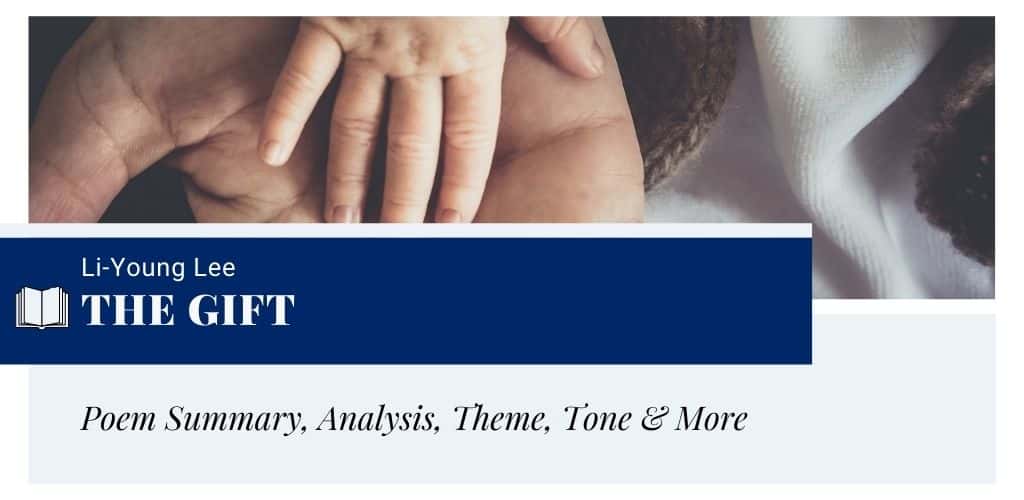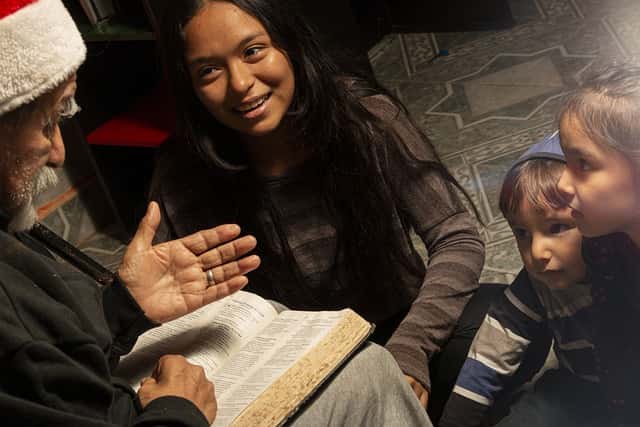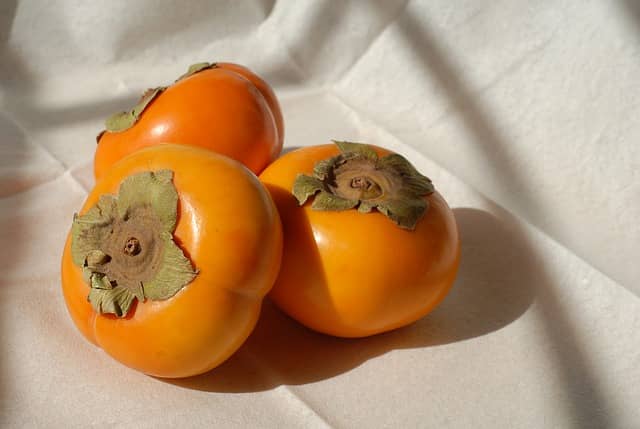The Gift by Li-Young Lee
“The Gift” is about a childhood memory of poet Li-Young Lee concerning his father dexterously pulling out a metal blade from his soft, little hand. Often, while we are doing something, our minds remind us of a familiar experience that happened in the past. In this poem, Lee describes such a feeling of déjà vu. This piece begins with a memory of the past, then quickly gives a glimpse of the present. Again, it delves deeper into poetic thoughts. Lee talks about the lesson of self-discipline and forbearance that his father taught him on that day.
- Read the full text of the poem “The Gift” below:
The Gift by Li-Young Lee To pull the metal splinter from my palm my father recited a story in a low voice. I watched his lovely face and not the blade. Before the story ended, he’d removed the iron sliver I thought I’d die from. I can’t remember the tale, but hear his voice still, a well of dark water, a prayer. And I recall his hands, two measures of tenderness he laid against my face, the flames of discipline he raised above my head. Had you entered that afternoon you would have thought you saw a man planting something in a boy’s palm, a silver tear, a tiny flame. Had you followed that boy you would have arrived here, where I bend over my wife’s right hand. Look how I shave her thumbnail down so carefully she feels no pain. Watch as I lift the splinter out. I was seven when my father took my hand like this, and I did not hold that shard between my fingers and think, Metal that will bury me, christen it Little Assassin, Ore Going Deep for My Heart. And I did not lift up my wound and cry, Death visited here! I did what a child does when he’s given something to keep. I kissed my father. - from Rose (1986)

Summary
At the beginning of “The Gift”, Lee’s poetic persona talks about a childhood incident. While he is carefully shaving off his wife’s thumbnail, this memory suddenly appears in his mind. When he was seven, one day, a piece of metal blade got stuck in his hand. He thought he would die of this blade. But, his father carefully removed the piece and taught him to stay calm. He told him a story while relieving him from his pain. Though the speaker cannot remember the story, he can clearly remember what his father tried to teach him. After the splinter was out, he kissed his father out of love and respect.
Structure & Form
Li-Young Lee wrote “The Gift” in free-verse. So, there is not any specific rhyme scheme or meter. In a few instances, readers can find the use of imperfect rhymes. There are a total of four stanzas without a regular line count. It is written from the perspective of a first-person speaker who represents the poet himself. Therefore, it is also an example of a lyric poem. Regarding the meter, it mostly consists of iambic feet. The rising rhythm of the iambs aptly reflects the theme of the poem.
Literary Devices & Figurative Language
Let’s have a look at the literary devices used in the poem that makes the poet’s thoughts more appealing to readers.
Imagery
Lee uses tactile and visual imagery throughout this piece. The image of the blade stuck in the speaker’s hand, conveys the pain associated with it. Besides, the poet visual imagery in order to depict the scenes of his childhood memory and the present. He also uses organic imagery to convey the love and respect he has for his father.
Hyperbole
It occurs in the following lines:
- “the iron sliver I thought I’d die from”
- “Metal that will bury me“
By using these exaggerating expressions, Lee depicts how a child gets scared easily of trivial accidents.
Enjambment
It occurs throughout the poem. The poet uses this to connect the lines of each stanza internally. He uses it to stylistically end the lines and maintain the flow.
Metaphor
In the second stanza, Lee metaphorically compares his father’s voice to a sacred “well of dark water”. Along with that, he compares his hands to “two measures of tenderness”. In the same stanza, “discipline” is depicted as flames.
Simile
- It occurs in “Watch as I lift the splinter out”. Here, the poet compares the way his father put the splinter out from his hand to the act of shaving the thumbnail.
- In “took my hand like this”, he similarly compares his hand to his wife’s hand and himself to his father.
Personification
It can be found in “Metal that will bury me” and “Death visited here!“.
Line-by-Line Analysis & Explanation
Lines 1-5
To pull the metal splinter from my palm
my father recited a story in a low voice.
I watched his lovely face and not the blade.
Before the story ended, he’d removed
the iron sliver I thought I’d die from.
Lee’s poem “The Gift” begins directly with a memory of his child. He shows how his father pulled a metal splinter out of his hand. While doing this he recited a story in low voice in order to take his attention away from the pain as well as the wound. This attitude of the speaker’s father shows his calmness. By reciting the story, he tried to fix his child’s mind elsewhere while he pulled the blade out.
He watched his calm and lovely face while his father carefully took the piece out. The blade was out of his focus. Way before the story ended, his father removed the sliver. Like any other child, he thought he would die from the blade. It seems the blade was an enemy with which his father (a hero in his eyes) fought in order to relieve his son from pain. The way he visualizes his father somehow elevates his status in readers’ eyes.
Lines 6-13
I can’t remember the tale,
but hear his voice still, a well
of dark water, a prayer.
And I recall his hands,
two measures of tenderness
he laid against my face,
the flames of discipline
he raised above my head.
In the second stanza, the speaker focuses on the lessons his father taught him on that day. He begins by saying that for the pain he could not listen to the story. But he can remember his voice. It was as soft as the sound of prayer. The poet further compares it to the sacred well containing dark water. The color of the water does not refer to any negative idea. Rather it describes the unseen depths of his father’s calm mind. The speaker can sense it by closing his eyes but he cannot measure it.
Lee uses synecdoche in “two measures of tenderness”. Here, the abstract idea refers to his father’s tender hands. The term “measure” refers to his skilled hands. In these lines, the speaker says that he can recall how he laid his tender hands against his face. The idea of laying hands on his face contains tactile imagery.
In the last two lines, he talks about how his father taught him to stay calm and disciplined in the face of any danger. He uses a metaphor in “flames of discipline”. The flames of self-discipline guide a person throughout his life and enlighten his path. In the last line “he raised above my head”, Lee describes how his father sparkled the flames of discipline in his mind.
Lines 14-20
Had you entered that afternoon
you would have thought you saw a man
planting something in a boy’s palm,
a silver tear, a tiny flame.
Had you followed that boy
you would have arrived here,
where I bend over my wife’s right hand.
In the third stanza of “The Gift”, Lee asks readers to imagine the scene. He says had they entered that afternoon, they would have thought that his father was not actually pulling out the piece of the blade from his hand. Rather, it would seem that he planted something in his palm.
By “silver tear”, the poet points to the unseen tear of his father that reflected on the shiny blade. It means his father was sad internally but he did not show it. By the phrase “tiny flame”, the poet is again referring to the idea of self-discipline. According to him, his father planted the seeds of forbearance and discipline in his heart.
Had the readers followed that boy, they would have arrived at the present scene where he bends over his wife’s right hand similarly. It means that he is actually revisiting his childhood memory. While bending over his wife’s right hand, he thinks of the event that happened to him before. But, now the characters have changed. Like his father, now the grown-up child is relieving his wife.
Lines 21-30
Look how I shave her thumbnail down
so carefully she feels no pain.
Watch as I lift the splinter out.
I was seven when my father
took my hand like this,
and I did not hold that shard
between my fingers and think,
Metal that will bury me,
christen it Little Assassin,
Ore Going Deep for My Heart.
He welcomes readers to imagine another scene where he shaves his wife’s thumbnail down. He does it so carefully that she doesn’t even feel any pain. In the next line, the speaker uses a simile to connect his childhood memory to the present scene. It seems the speaker is experiencing déjà vu.
The childhood memory happened when he was seven years old. He is now a married man. But, the memory is still clear in his head. He holds his wife’s hand like his father did that afternoon. It means that the speaker is now following the same path shown by his father. The values of forbearance, calmness, and self-discipline are still with him.
After his father removed the shard from his palm, he did not hold it between his fingers thinking, “Metal that will bury me“. Here, Lee uses synecdoche to refer to the blade. Besides, he uses hyperbole in order to portray his childhood fear. He thought that little blade would cost him his life.
He christened it by the name “Little Assassin” and thought that the “ore” (another use of synecdoche) would go deep into his heart. In this way, the poet depicts the psychology of children. Even the slightest cut can make them think it would end their life. But, the poet did not think in that way as his father taught him to stay calm and not to be afraid of such little accidents.
Lines 31-35
And I did not lift up my wound and cry,
Death visited here!
I did what a child does
when he’s given something to keep.
I kissed my father.
In the last four lines of the poem “The Gift”, the poet refers to the main idea for the first time. The speaker says that he did lift his wound in fear and cried. He points to the cut by saying, “Death visited here!” Lee personifies the abstract idea of “Death” in this rhetorical exclamation.
In the following lines, he implicitly hints at the gift (or a variety of gifts packed into a single box?) given by his father that afternoon. This gift was not something that can be touched or opened with excitement. It is a gift that is rather felt. After getting presents, children generally show their love to their parents by kissing. Likewise, the speaker kissed his father.
So, what does “The Gift” stand for? It symbolizes the way his father relieved him from his pain, the quality of forbearance learned from his father’s peaceful look and the virtue of self-discipline that he practices throughout his life.
Theme
“The Gift” explores a variety of themes that include but are not limited to discipline and forbearance, the father and son relationship, and childhood. In this poem, the theme of discipline and forbearance forms the backbone of the story of a father relieving his son from his pain. Through this episode, Lee highlights the importance of staying calm and being self-disciplined in life. There are moments when one loses control of the things around him. Then the victor is the one who remains calm and does his job with discipline. The speaker’s father stayed calm and did not show a sign of pain (arising from his son’s cut) or hesitation. He just pulled the cause of pain out and his child did not even notice it was out.
Tone & Mood
The tone of this piece is nostalgic and emotive. It is filled with the spirit of childish innocence with a balanced sense of realism. The speaker of this piece on one hand highlights the role of his father in his life. On the other hand, he describes how he is walking on the same path shown by his father. Therefore, throughout this piece, the tone is appreciative. If readers decode the meaning of the lines, they can realize that this poem is written out of love for his father. This love is also reflected in the tone of this piece. The way he says these lines “I did what a child does … I kissed my father” makes it clear.
Historical Context
Li-Young Lee’s poem “The Gift” appears in his first book of poetry, Rose published in 1986. Lee had a strong relationship with his father. His father often read to him, encouraging him to find his passion in literature. Lee began to dive into the art with the embalming assistance of his father. Lee wrote a number of poems looking back at those days when he was with his father. For example, in “Eating Together,” published in the same poetry collection, he talks about how badly he misses his father at the family lunch after his sad death. Likewise, in this poem, he shares a fragment of his childhood concerning how his father taught him the lessons of calmness and discipline through the simple yet cautious act of pulling out a blade from his palm.
Questions and Answers
In “The Gift,” Li-Young Lee talks about three different gifts packed into a single box. But, all these gifts are abstract, even the box. In this piece, Lee refers to the gifts of forbearance and self-discipline that his father taught him in his childhood. The way his father relieved him from his pain is also a form of a gift. This incident taught him how not to be swept away in accidental situations.
Firstly, Lee talks about an incident that happened with him in his childhood. At that time he was seven years old. He can remember how his father carefully pulled out a piece of the metal blade from his hand without even causing him any pain. The second incident is about how the grown-up speaker carefully shaves the thumbnail of his wife.
The phrase “a well of dark water” is a symbol of purity and calmness. Lee compares his father’s soft voice to the water of a sacred well, referred to as “a well of dark water”. Like the dark water does allow one to look at the well’s depth, the speaker could not measure the depths of his father’s mind by merely looking at his embalming face.
The poem was originally published in 1986 in Li-Young Lee’s first poetry collection, Rose.
The speaker of this poem is none other than the poet himself. He used the first-person point of view in order to narrate his childhood experience.
Similar Poems about the Parent-Child Relationship
- “The Writer” by Richard Wilbur – It’s about the poet’s daughter (Ellen Wilbur), who faces challenges while writing a short story.
- “Exile” by Julia Alvarez – It’s about the poet’s departure from her country (Dominican Republic) due to her father’s involvement in the plot against Rafael Trujillo.
- “The Toys” by Coventry Patmore – This poem centers on an incident of a father rebuking his son.
- “The First Snowfall” by James Russell Lowell – It’s about the death of Lowell’s first daughter Blanche and how the snowfall reminds him of her.
External Resources
- Li-Young Lee Reads the Poem — Listen to the poem aloud to understand the tone and mood.
- Understanding the Poem — Listen to Rebecca Balcarcel reading and explaining the text.
- About Li-Young Lee — Learn about the poet’s life and works.
- Poet Profile & Poems of Li-Young Lee — Explore more about the poet and read some of his well-known poems.




